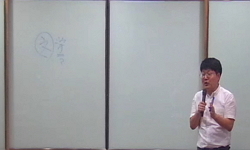The feminist theology that appeared in the 1960s suggests “Hermeneutics of suspicion” against literalism of biblical interpretation. This became a process of criticizing patriarchal ideology, which was the base of the biblical text itself and conv...
http://chineseinput.net/에서 pinyin(병음)방식으로 중국어를 변환할 수 있습니다.
변환된 중국어를 복사하여 사용하시면 됩니다.
- 中文 을 입력하시려면 zhongwen을 입력하시고 space를누르시면됩니다.
- 北京 을 입력하시려면 beijing을 입력하시고 space를 누르시면 됩니다.
여성신학적 이데올로기 비판과 리쾨르(Paul Ricoeur)의 은유 이론 = Feminist Theological Ideology Critic and Metaphor Theory of Paul Ricoeur
한글로보기부가정보
다국어 초록 (Multilingual Abstract)
The purpose of this thesis is to examine whether there exists a connection point between the ideology criticism work of the feminism theologians and Ricoeur’s metaphor hermeneutics. Feminism theologian Ruether regards the objective of ideology criticism to be overall restoration of humanity of women. Ruether insists that feministic biblical interpretation should be based on an experiential Hermeneutics circle that penetrates that past and present. In order to turn this circle into a virtuous circle rather than the vicious circle of Heidegger, the process of “self-understanding before the text” that Ricouer’s hermeneutics adheres, should be carried out.
Compared to Aristotle, who sees metaphor as a substitute for word, Ricouer expands the concept to the level of text. He accommodates the interactive theory of metaphor. I. A. Richards, Max Black, and Monroe Beardsley reject denomination of metaphor. They say that metaphor stems from “interaction between two different domains of semantics.” The reason Ricouer expropriates the interactive theory of metaphor is relevant with “innovation of metaphoric meaning.” Metaphor becomes a live metaphor through semantic innovation and completes the Dialectics of semantics and reference. This is the creative power of metaphor. Ricouer suggests that by using this creative power of metaphor, metaphoric verity is exposed through the tension between “be” and “not be”.
Since the advent of modern studies, metaphor has been regarded to be a vague, unscientific language. Being a poetic language, metaphoric language is the language of reversion and limitation. Therefore, direct ideology criticism can be difficult through metaphoric language. Yet, if metaphor is extended to the level of text and placed upon hermeneutics of explanation and understanding, ideology criticism is an inevitable factor to go through the process. This point is where Ricouer’s hermeneutics and feministic ideology criticism meet. As a metaphoric text, the Bible has possibility to be reestablished through feministic ideology criticism.
The feminist theology that appeared in the 1960s suggests “Hermeneutics of suspicion” against literalism of biblical interpretation. This became a process of criticizing patriarchal ideology, which was the base of the biblical text itself and conventional biblical interpretation.
The purpose of this thesis is to examine whether there exists a connection point between the ideology criticism work of the feminism theologians and Ricoeur’s metaphor hermeneutics. Feminism theologian Ruether regards the objective of ideology criticism to be overall restoration of humanity of women. Ruether insists that feministic biblical interpretation should be based on an experiential Hermeneutics circle that penetrates that past and present. In order to turn this circle into a virtuous circle rather than the vicious circle of Heidegger, the process of “self-understanding before the text” that Ricouer’s hermeneutics adheres, should be carried out.
Compared to Aristotle, who sees metaphor as a substitute for word, Ricouer expands the concept to the level of text. He accommodates the interactive theory of metaphor. I. A. Richards, Max Black, and Monroe Beardsley reject denomination of metaphor. They say that metaphor stems from “interaction between two different domains of semantics.” The reason Ricouer expropriates the interactive theory of metaphor is relevant with “innovation of metaphoric meaning.” Metaphor becomes a live metaphor through semantic innovation and completes the Dialectics of semantics and reference. This is the creative power of metaphor. Ricouer suggests that by using this creative power of metaphor, metaphoric verity is exposed through the tension between “be” and “not be”.
Since the advent of modern studies, metaphor has been regarded to be a vague, unscientific language. Being a poetic language, metaphoric language is the language of reversion and limitation. Therefore, direct ideology criticism can be difficult through metaphoric language. Yet, if metaphor is extended to the level of text and placed upon hermeneutics of explanation and understanding, ideology criticism is an inevitable factor to go through the process. This point is where Ricouer’s hermeneutics and feministic ideology criticism meet. As a metaphoric text, the Bible has possibility to be reestablished through feministic ideology criticism.
목차 (Table of Contents)
- Ⅰ. 서론
- Ⅱ. 여성신학적 이데올로기 비판
- Ⅲ. 리쾨르의 은유 해석학
- 1. 상징, 의미론, 존재론
- 2. 은유와 상호작용이론
- Ⅰ. 서론
- Ⅱ. 여성신학적 이데올로기 비판
- Ⅲ. 리쾨르의 은유 해석학
- 1. 상징, 의미론, 존재론
- 2. 은유와 상호작용이론
- 3. 은유의 의미 혁신
- 4. 은유의 창조적 힘
- Ⅳ. 리쾨르의 은유 이론과 이데올로기 비판
- Ⅴ. 결론
- 참고문헌
- Abstract
동일학술지(권/호) 다른 논문
-
트린 민하(Trinh T. Minh-ha)와 스피박(Gayatry Chakravorty Spivak)을 통해 본 탈식민지적 여성이해
- 이화여자대학교여성신학연구소
- 최순양
- 2013
-
- 이화여자대학교여성신학연구소
- 박인희
- 2013
-
- 이화여자대학교여성신학연구소
- 김태연
- 2013
-
- 이화여자대학교여성신학연구소
- 이주아
- 2013




 RISS
RISS KISS
KISS







